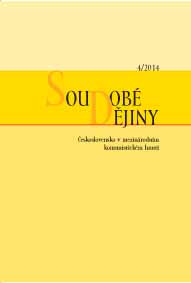Portugalci v „komunistické Ženevě“: Praha jako středisko antisalazaristické opozice (1948–1974)
The Portuguese in ‘Communist Geneva’: Prague as a Centre of the Opposition to Salazar, 1948–74
Author(s): Pavel SzobiSubject(s): History
Published by: AV ČR - Akademie věd České republiky - Ústav pro soudobé dějiny
Summary/Abstract: This article is discusses part of the political opposition to the authoritarian regime of António Oliveira de Salazar (1889–1970) in Portugal, which comprised Portuguese Communist emigrants to Czechoslovakia, who had come to the country between the Communist takeover in Czechoslovakia in 1948 and the ‘Carnation Revolution’ in Portugal in 1974. On the basis of records from Portuguese and Czech archives, the author traces their activity, status in the host country, and links with the exile centre of the Portuguese Communist Party in Moscow, which was led by Álvaro Cunhal (1913–2005), all against the background of relations between Czechoslovakia and Portugal in the twentieth century. The metaphor ‘Communist Geneva’ in the title of the article refers to Prague as the headquarters of a number of international organizations and also as the centre of left-wing emigration from Mediterranean countries of Europe (Greece, Yugoslavia, Italy, Spain) and elsewhere. Although Prague became mainly a safe transit point and a meeting place for Portuguese exiles between France and the Soviet Union, some members of the Portuguese Communist Party came to Czechoslovakia to live for longer periods. They were, however, far fewer in number than members of the other national exile communities in Prague; the author estimates that in the course of the 1950s and 1960s they numbered between only between ten and twenty. He pays special attention to the figure of General Humberto Delgado (1906–1965), who, after his failed candidacy in the rigged presidential elections of 1958, became the representative figure integrating the anti-Salazar opposition. The author closely considers Delgado’s negotiations with Portuguese Communist representatives in Prague in 1964. The milestone for the Portuguese community in Czechoslovakia was, according to the author, the Soviet occupation in August 1968, which local Portuguese Communists, unlike the exile leadership of the Party, condemned, and in consequence most of them gradually also split with the Communist movement. The author discusses events right up to the end of the 1990s, when President Mário Soares’s (b. 1924) friendly visits to his counterpart in Prague, Václav Havel (1936–2011), came to symbolize the new relations between Czechoslovakia and Portugal.
Journal: Soudobé Dějiny
- Issue Year: XXI/2014
- Issue No: 04
- Page Range: 609-634
- Page Count: 26
- Language: Czech

